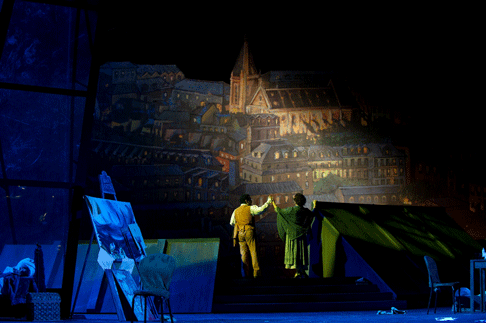19 Aug 2011
La Bohème at Torre del Lago
This is where Puccini composed many of his operas until the lake got so polluted he had to move to nearby Viareggio.

This is where Puccini composed many of his operas until the lake got so polluted he had to move to nearby Viareggio.
Like Bayreuth the Torre del Lago is devoted exclusively to the works of one composer. But unlike Bayreuth the Fondazione Puccini exerts little effort to glorify the legacy of this remarkable composer by staging productions that may fulfill the operatic expectations of the unwashed masses but leave serious Puccini disciples aghast.
Such was the effect of La Bohème (8/12) seen from press seats in the 26th row of the 3200 seat Gran Teatro all’Aperto Giacomo Puccini at the edge of Lake Massaciuccoli, a sort of swamp by the Mediterranean near Pisa. Actually the 26th row is even more distant from the action than it would ordinarily be because not only are there several wide lateral aisles between sections, there is also a lot of legroom (a boast of the management).
Thus those of us in this section felt rather remote from the performance, encouraging some seaside bathers sitting nearby to follow the libretto on the screens of their cell phones with the added advantage of not missing urgent text messages, and others to sotto voce the story to their children — the lack of supertitles thus compensated (though these kids were far too young to read). After the first act the audience readjusted itself and we found seats in the 16th row amidst more serious spectators.
Here at least there was something to appreciate — the well-schooled verismo conducting of Alberto Veronesi was apparent (Mo. Veronesi is Eve Queler’s successor at the Opera Orchestra of New York), and the proficient opera acting and idiomatic Italian tenor singing of Venezuelan Aquiles Machado as Rodolfo was pleasurable. The mature style and presence of Italian baritone Marzio Giossi balanced the lively young and appropriately Italianate Colline of South Korean bass Seung-Pil Choi (it had to be him though the program gave another name).
Italian soprano Anna Maria dell’Oste made some fun as a Musetta who knew all the classic moves. Of the principals only the Mimi of Italian soprano Serena Farnocchia disappointed, her Mozartian delivery and matronly presence failed to capture the musical and dramatic energy imparted by the rest of the cast. Most notably it was Mr. Machado who generated real Puccini magic in his third act farewell to Mimi and with his final cries at her death. He accepted his abundant applause with extravagantly florid bows.

Rome Opera resident stage director Maurizio di Mattia moved his very experienced cast with slick flair, though he imposed a tasteless appearance of Puccini himself to watch the death scene. Rome Opera scene painter Maurizio Varamo designed the sets and presumably it was he who painted a quite wonderful backdrop of Paris for his set. But its architecture betrayed crudeness and naivete, especially the kitsch Tour Eiffel. The production was first seen in Hong Kong where it was not un-appreciated.
In flagrant disregard of current performance practice principal bows were effected after each of the four acts cruelly lengthening the evening, interminable already because of the clumsy production could not possibly be organized into the now usual two part format. A lot of fine Pommery champagne, a sponsor of the festival, flowed between the acts making the sculptures in the large garden seem very witty indeed by the early morning hours of the next day.
Michael Milenski